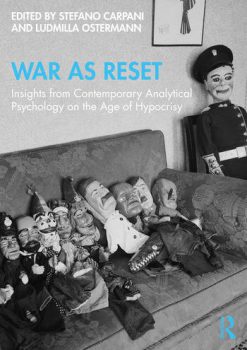In an age continuously shaped and shocked by wars and societal crises, this book serves as an antidote to superficial media frenzy. Exploring the interplay between the insights from analytical psychology and global dynamics, it unravels the meanings behind our shared fears and invites readers to confront challenging truths shaping our present and future.
The first part of this book explores the multifaceted aspect of war, as Stefano Carpani interviews authoritative figures from the fields of Jungian psychoanalysis, sociology, history and religion. Their insights shed light on the meaning of war, the concept of fatherland, the masculine nature of war and the potential for total conflict. In part two of the book, Jungian therapists reflect on their experiences, offering insights into the impact of war on the field of analysis, presenting a comprehensive exploration of war from interdisciplinary perspectives. The contributions touch upon themes like the Israeli-Palestinian conflict, healing through arts-based research, violence practiced by the state in Argentina, sexual violence or the effect of the IRA on Irish society.
This book proposes that war often serves as a reset mechanism, and that our era can be termed the one of hypocrisy. It will be of interest to academics, scholars and students within the fields of analytical psychology, psychosocial studies, psychoanalysis and sociology.
Table of Contents
Preface
Stefano Carpani
Introduction
Ludmilla Ostermann
Part 1
1. Day 22nd of War
Tine Papič
2. Day 27th of War
Murray Stein
3. Day 33rd of War
George Hogenson
4. Day 37th of War
Caterina Vezzoli
5. Day 40th of War
Giuseppe Bettoni
6. Day 42nd of War
Joe Cambray
7. Day 52nd of War
Dmytro Zaleskyi
8. Day 55th of War
Dmitry Kotenko
9. Day 59th of War
Iryna Semkiv
10. Day 69th of War
Vickie Sims
11. Day 70th of War
Verena Kast
12. Day 84th of War
Luigi Zoja
13. Day 92nd of War
Elana Lakh
Part 2
1. Analysis in the Shadow of Terror: Clinical Aspects
Henry Abramovitch
2. Donbas in the Battle for Cultural Identity, or Cultural Identity in the Battle for Donbas
Natalia Bolycheva
3. Sicily’s Infinite War – a neo-Jungian point of view
Chiara Capri
4. The Preserved Moment Through Art: Looking At Jungian Art-Based Research And The Articulation Of Inherited War Traumas
Roula-Maria Dib
5. Embodied Analysis: The Recovery Of Early Psychological Functions Interrupted By An Experience Of Early Trauma Due To State Terrorism
Karin Fleischer
6. Dream with the Heart, and the Heart of Dream
Shen Heyong
7. The Sacrificial Murder of Palestine: Grinding Bones to Dust
Heba Zarigi
8. The Northern Ireland Conflict: From I.R.A., to Sinn Fein, to Peace
Ireland’s Cultural Complexes Transformed
Kathleen Kirgin
9. When our shadow makes us blind and deaf to suffering
Elana Lakh
10. Insight into an analysis with a patient who became frozen in fear because of the war
Marianne Meister-Notter
11. Destructiveness, Complexity And Archetypal Epistemology: Critical Reflections
Renos K. Papadopoulos
12. ‘Tales of trauma, terror, and awe’
Counter- trauma, Counter- Adversity Activated Development, and mutual transformations in the clinical setting with survivors of collective violence
Elias Winterton
Outro by Stefano Carpani

